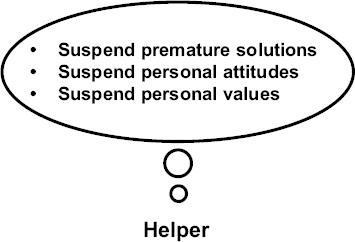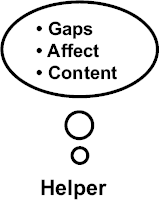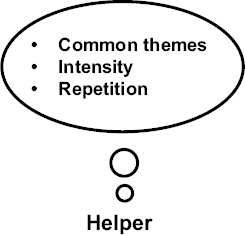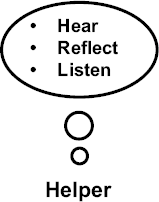The sources of input that we most often rely on in helping are the verbal expressions of the helpees. What people say and how they say it tells us a lot about how they see themselves and the world around them. Ultimately, the helpees’ verbal expressions are the richest source of empathic understanding for the helper.
When we give the helpees our full and undivided attention, we are prepared for listening to their verbal expressions. The more we attend to the external cues presented by the helpees, the more we can listen to the internal cues reflecting their inner experiences. There are many ways that we can develop our listening skills. These include having a reason for listening, suspending our judgment, focusing upon the helpee and the content, and recalling the helpees verbal and nonverbal expressions while listening for common themes. Listening prepares us for responding empathically to our helpees.

LISTENING
First, as listeners, we should know why we are listening. We should have a reason for listening. The goal of helping is the reason for listening—to gather information related to the problems or goals presented by the helpees.
As with observing, we should listen for cues that indicate the helpees’ levels of physical, emotional and intellectual functioning. To do this, we must focus not only upon the words but also upon the tone of voice and the manner of presentation. The words will tell us the intellectual content of the helpees’ experiences. The tone of voice will tell us about the helpees’ attendant feelings. The manner of presentation will tell us about the helpees’ energy levels. For example, content expressed in a dull tone of voice and in a listless manner suggests a depressed helpee with a low level of energy.

HAVING A REASON FOR LISTENING
Next, it is important to suspend our own personal judgments in listening, at least initially. If we are going to listen to what the helpees say, we must temporarily suspend the inner dialogue that we carry on with ourselves. We must let the helpees’ messages sink in without trying to make decisions about them.
Suspending judgment means suspending our values and attitudes regarding the content of the helpees’ expressions. For example, we may not approve of the helpees’ behaviors or the ways they are living their lives. Our feelings, however, are not relevant to the helpees’ experiences. Our purpose is to facilitate the helpees’ growth and development. In addition, we must exercise caution in offering premature solutions, no matter how many times we think we have been over this ground with others. Each helpee has a unique experience, and it is our job to allow the uniqueness of that experience to emerge.

SUSPENDING PERSONAL JUDGMENT
Perhaps the most important thing in listening is to focus upon the helpees. We focus upon the helpees by resisting distractions. Just as we initially resist the judgmental voice within ourselves, so must we also resist outside distractions. There will always be a lot of other activities going on that will challenge our ability to listen.
We must place ourselves in quiet places so that we can focus upon the helpees’ inner experiences. To the degree that we can, we must use a helping context that avoids noises, views and people—anything or anyone that will take our attention away from the helpees to whom we are listening. We must summon all of our energy, affect and intellect to focus upon the helpees’ inner experiences and external behaviors so that we can respond accurately to those experiences and behaviors.

FOCUSING UPON THE HELPEES
In listening to the helpees, we focus initially upon the content. In focusing upon the content, we want to be sure that we have all of the details of the helpees’ experiences; otherwise, we will not be able to help them to understand their experiences. We focus upon content by asking ourselves the 5WH basic interrogatives:
Who?
What?
Why?
When?
Where?
How?
If we can answer these questions, we can be sure that we have the basic ingredients of the content of the helpees’ experiences. If we cannot answer these questions, we should continue to listen. As the helpees share their experiences, they will fill in the missing information for us.
FOCUSING UPON THE CONTENT
We should concentrate intensely enough upon the helpees’ expressions to be able to recall both the content and the attendant affect of the helpees. In addition we also want to recall any gaps—missing information.
To practice your listening skills in recalling brief expressions, try to recall the entire expression verbatim. With lengthy expressions, try to recall the gist of it. After you read the following expression of a young man in trouble, try to recall the content, affect and any “gaps” in information.
“Things are not going so good for me. Not in school. Not with my girl. I just seem to be floundering. I fake it every day, but inside I’m really down because I’m not sure of what I want to do or where I want to go.”

RECALLING THE EXPRESSION
We must also learn to recall the helpees’ expressions over a period of time. In so doing, we are looking for the common themes in the helpees’ experiences. The helpees’ important themes will be repeated over and over. Usually, the helpees will invest the most intensity in these themes because they are trying to communicate them to us.
These themes will tell us what the helpees are really trying to say about themselves and their worlds. They will tell us where they are “coming from” if we just provide them the opportunity. We need only receive the messages they are sending and process them for their common themes. This will prepare us to respond accurately to the helpees.
We should practice listening for themes in our daily conversations. For now, we can use the case studies at the end of each chapter. See how well we do when compared to the helpers involved.

LISTENING FOR THEMES
There is no question that listening is hard work. It requires intense concentration. However, just as there are different rates for reading, there are different rates for listening. Most people talk at the rate of 100 to 150 words a minute, yet we can easily listen at a rate of two or three times that amount. We can put this extra time to use by reflecting upon or thinking about what the helpees have said.
Most of us have been taught not to listen or to hear. Years of conditioning have gone into this. We are distracted because we do not want to hear. We distort the expressions because of the implications of understanding. Most of all, there are the implications for intimacy that make people fearful. Just as we have been conditioned not to listen and not to hear, now we must train ourselves to listen actively and to hear the expressions of the helpees.

HEARING
